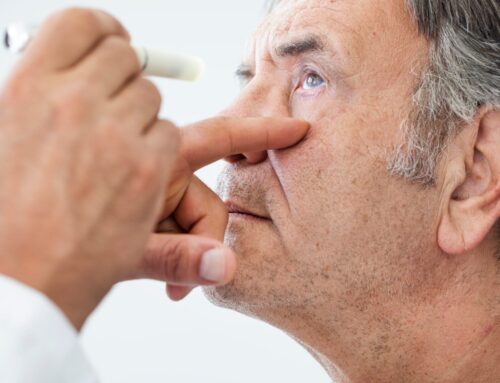
Cataracts And Vision Correction: Will You Still Need to Wear Glasses?
Cataracts are a common eye problem that can occur due to ageing. The condition clouds the lens of your eye, impairing your vision as it worsens over time. Cataract surgery is the most effective way to treat cataracts — it completely removes the cloudy lens and replaces it with an artificial one.
However, if you wear prescription glasses, you may wonder whether you still need to wear them after cataract surgery. Or perhaps you’re curious to see if your vision can be corrected with cataracts. Learn more about cataracts and vision correction with Eye Clinic London.
Glasses before cataract surgery
Before you have cataract surgery, cataracts will most likely impair your vision. Wearing your prescription glasses can help temporarily, but the right prescription is essential. Your spectacles must counteract your vision problems, such as short-sightedness, long-sightedness and astigmatism.
Wearing glasses if you have cataracts can enhance visual acuity — your ability to discern the shapes and details of the things you see — by correctly focusing light onto your retina. Doing so compensates for the lens’ clouding and can result in clearer, sharper vision.
Cataracts can also cause sensitivity to glare, especially in bright sunlight or when driving at night. Wearing glasses with tinted lenses can help reduce glare, making it easier to see in different lighting conditions.
If your cataracts are in the early stages of development and don’t significantly impair your daily life, you won’t need surgery immediately. Wearing the correct prescription glasses can help you manage your symptoms temporarily. However, as cataracts are progressive, eventually, the glasses will not work, and you’ll need surgery.
Wearing glasses and contacts after cataract surgery
Cataract surgery is an effective treatment that can restore your vision. However, even after replacing the cloudy lens with a clear artificial one, you might still need vision correction to improve your sight.
Wearing glasses after cataract surgery
The lens is a curved piece of tissue in your eyes that sits behind the pupil. Your vision is focused differently depending on how light enters your eyes. As the artificial/Intraocular lens (IOL) is placed in your eye during cataract surgery, whether you need glasses will depend on the type of IOL you choose.
Most patients will choose monofocal lenses after the cataract surgery that will give them good distance vision but they will need glasses for near and intermediate vision.
Some choose multifical option that offers near and far vision at the same time but it can still leave you with blurry vision so you will still find that you need to use glasses to complete certain tasks.
To reduce the need for glasses, some patients will opt for monovision. This can be achieved if you are undergoing cataract surgery for both eyes, where one eye is tuned for long distance and the other eye’s lens is tuned for the near distance.
After cataract surgery, your prescription might change. So, you must visit an optician to retest your eyes and update your prescription. Wearing the wrong prescription glasses makes it harder to see and strains your eyes — something you want to avoid after cataract surgery.
It is adviced to wait for at least six to eight weeks after the cataract surgery before going to check how your prescription might have changed. This period is vital for your eye’s recovery and healing process.
During your recovery from cataract surgery, the surgeon will also advise you to wear dark sunglasses to protect your eyes and promote healing.
Dark sunglasses can help your eye adjust to the new artificial lens. Initially, your eyes will be sensitive to light, so wearing dark sunglasses throughout your recovery can relieve any discomfort.
When choosing your new prescription glasses, opt for lenses with additional ultraviolet (UV) protection.
Wearing contact lenses after cataract surgery
If you used to wear contact lenses, prior to having cataract surgery, you must wait for four to six weeks before wearing them again. It is very important to remember that after cataract surgery your eyes might feel extremely uncomfortable and dry so it is vital to give them a generous amount of time to heal.
As with glasses, an expert should test your vision again because it may have changed. If you are unsure when to start wearing contact lenses again, speak with your optician or ophthalmologist.
Astigmatism and cataracts
Astigmatism means the surface of your eye or the lens behind it is not spherical, causing light to distort when it enters. The result is blurry vision in one or both of your eyes.
There are two types of astigmatism: regular and irregular. In regular astigmatism, your cornea curves more in one direction than in the other.
Glasses or contact lenses can easily correct it. Often, an injury is the cause of irregular astigmatism and glasses can’t always help. However, contact lenses can sometimes be more effective.
You can still undergo cataract surgery if you develop cataracts alongside your astigmatism. Treatment for cataracts will not make your astigmatism worse. In some cases, the surgeon can also treat astigmatism during cataract surgery. Essentially, having both treated simultaneously means a surgeon can restore your vision, and you may no longer need glasses once you recover.
However, it’s always best to have an eye test after cataract surgery, even if an expert treated your astigmatism. Your vision may have other issues you aren’t aware of and an optician can ensure you aren’t straining your eyes.
Book a consultation with Eye Clinic London
Vision correction can sometimes be necessary after cataract surgery, but sometimes it’s no longer needed. However, protecting your eyes from UV rays is always essential, even if you no longer need glasses or contact lenses.
If cataracts affect your vision, book a consultation with Eye Clinic London. Simply fill out our online form to request a callback, or call us on 0203 807 5063.
Our knowledgeable ophthalmologists are on hand to help enhance your vision and improve your eye health.
Sources

About the expert
Mr Hamada | Consultant Ophthalmologist and Corneal Surgeon
MD, MSc, DO (hons), FRCSEd, FRCOphth I am Samer, founder and consultant ophthalmic surgeon with over 20 years’ experience in ophthalmology. I am a world-renowned specialist in cornea, cataract and refractive surgery. I’m not only a leading surgeon but also the only dual fellowship trained in corneal diseases in children from reputable institutions in the UK. At Eye Clinic London I work closely with other consultant ophthalmologists, optometrists and orthoptists to achieve the best outcomes for our patients. Our main aim is to make sure our patients get the safest and best treatments available to them. We put your safety before anything else so you can rest assured that if you choose us you will be in the best and safest hands.



